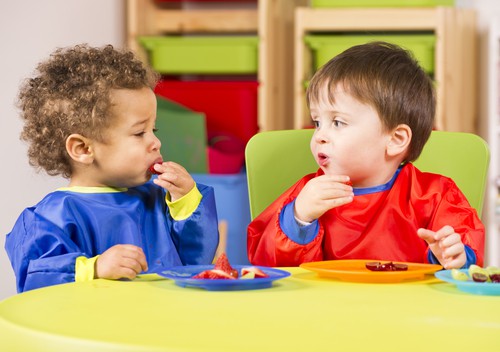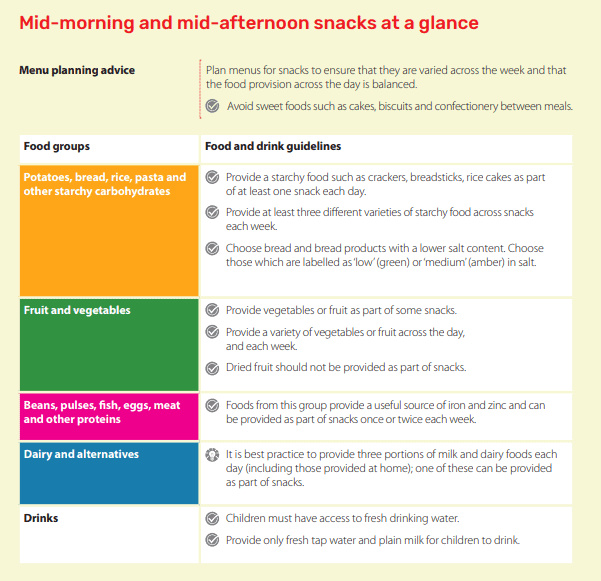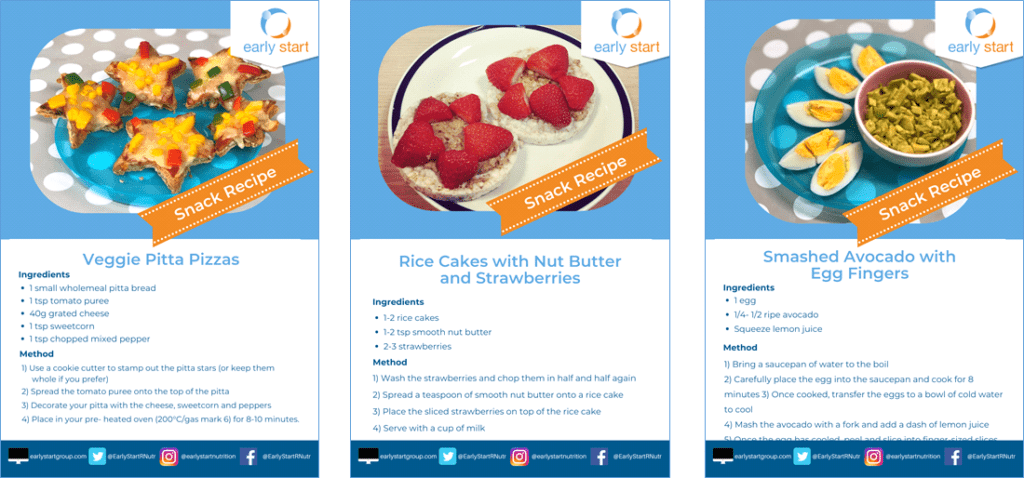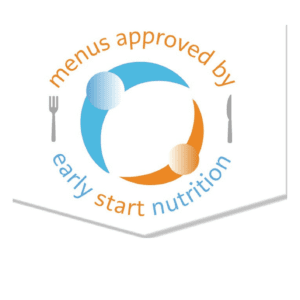A common question we’re asked here at Early Start Nutrition, is around what foods to serve children at snack time. In this blog we’ll be exploring how to plan healthy snacks for little ones and which foods to include.
As part of a healthy meal routine, toddlers (over the age of 1 year) should be offered 2-3 healthy snacks across the day. One mid-morning (between breakfast and lunch), one mid- afternoon (between lunch and tea) and an optional evening snack. This helps children to maintain their energy levels and provides them with important nutrients to support their growth, development and learning.
Current recommendations in the UK state that children under 1 year of age don’t need snacks, as their meals and milk feeds with be sufficient in providing them with the energy and nutrition that they need.

Timings of meals and snacks
It’s a good idea to offer meals and snacks at a similar time each day. This allows children to establish a good meal routine, which helps them to manage their appetite. Ideally there should be around a 2-3 hour gap between each meal and snack. If offered too close together, for example snack at 10:30am and lunch at 11:30am, it’s likely to reduce a child’s appetite for the food offered at the main meal.
In our work with early years settings, we’ve found some have difficulty with the spacing of meals and snacks. Staffing issues and fitting in other daily activities can make the timings of meals and snacks difficult. However, it’s essential that you provide children with a suitable meal and snack routine and work together to create solutions to overcome any potential barriers.
The ideal mealtime should last around 20- 30 minutes. This is enough time for children to eat as much as they need, without feeling rushed or losing interest. Of course, some children may take a little longer than others, so it’s important to recognise their individual needs.
It’s important for parents to be made aware of the meal and snack routine/timings you’ll be following in your early years setting, so share your menu with them. This will help families to follow a similar routine at home, to ensure consistency for their child.

Rolling Snack Bar
Some nurseries offer a rolling snack bar system. This allows children to participate in snack times when they feel ready to and encourages independence. This can work really well and is seen to be less disruptive to children’s playing and learning.
It’s important to remember that a rolling snack bar should be open for a set length of time. Settings who make snacks available to children at any time of the day can create a grazing culture. This means children may have several snacks throughout the day, which is likely to reduce their interest and appetite for the foods served at main meals. To avoid this happening, it’s important to carefully organise and manage snack times. Limit the time your snack bar’s open- to around 30-60 minutes, and remember to factor this in when timing your main meals.
It’s important that children sit down at a table to eat their snacks and are always supervised. This will also help to ensure that children are encouraged to learn good eating behaviours.

Top tips to ensure the smooth running of rolling snack:
- Encourage children to serve their own snack
- Make sure your snack table has a jug of water. Children should be encouraged to pour their own
- Tell children when the snack table is open and give them a 5 minute notice when the snack table is about to close
- Keep track of the children that have had snack. You could try having name cards on a table that children give to you when they sit at the snack bar
- If a child does not wish to eat a snack, encourage them to come to the snack bar for some water
- Promote good hygiene and remind children to wash their hands before eating
- Encourage children to tidy up after snack, e.g. placing bowls and cups in a washing up bowl
- Allocate one member of staff to manage the snack table. It should be their role to maintain good hygiene practices, promote self-service skills, promote language and communication development, make observations and keep track of the children who have and have not had snack
- Staff members should be encouraging and role- model eating and drinking during rolling snack.
What foods should we serve at snack time in our early years setting?
Snack times are a great opportunity to offer children a range of nutritious foods. Variety is key, so try to ensure you aren’t serving the same snacks too frequently. Plan your snack menu to ensure variety across the week, following these guidelines:
 Source: Eat Better Start Better Guidelines (opens in new tab)
Source: Eat Better Start Better Guidelines (opens in new tab)
Food Safety At Mealtimes
The EYFS framework (opens in new tab) requires providers to take all necessary steps to keep children safe and well – and you must be confident that those responsible for preparing and handling food in your setting are competent to do so. In group provision, all staff involved in preparing and handling food must receive training in food hygiene. Infants and young children should be seated safely in a highchair or appropriately sized low chair while eating. Infants and young children should never be left alone while they are eating, and staff should be familiar with paediatric first aid advice for children who are choking.
For guidance on Preparing Foods Safely to Reduce the Risk of Choking (opens in new tab) you can check out our blog, which includes our YouTube video containing lots of visual aids.
Food Ideas for Snack Time
Starchy Foods- pitta bread, bread fingers, chapatti, tortilla wraps, rice cakes, low salt breadsticks, crackers, crumpet, bagel slices, sliced sweet potato, teacake, malt loaf.

Pictures from left to right: homemade bunny pancake, The Very Hungry Caterpillar sandwiches, tortilla stars with hummus, toast with smooth peanut butter and banana.
Fruit and Vegetables- Vegetables- carrot, cucumber, pepper, avocado, beetroot, tomatoes (slice cherry tomatoes into quarters to prevent choking), celery, butternut squash, suede, mushrooms.
Fruit: Orange, apple, pineapple, banana, grapes (sliced into quarters length-ways), strawberries, blueberries, pear, raspberries, mango, papaya, guava, star fruit, blackberries, peach, kiwi. Choose fruit and vegetables in season.

Pictures from left to right: kiwi and raspberry Christmas tree, celery snails with smooth nut butter/cream cheese, strawberry and watermelon fruit kebabs, orange fruit cups with raspberries and blueberries
Protein Foods- hummus, tahini, sliced egg, mashed fish dip, mashed bean dip, sliced chicken, turkey, pork, beef, tofu, falafel, Quorn pieces.

Pictures from left to right: pepper frittata (made with egg), pumpkin hummus with pepper and breadsticks, egg fingers with smashed avocado, smooth nut butter with apple fingers
Dairy and Alternative Foods- yoghurt, fromage frais, cream cheese, hard cheese, milk.

Pictures from left to right: cheese triangles with pretzels, mini pizzas with cheese and vegetables, plain yoghurt with mashed raspberries, cheese stars with crackers
FREE Snack Recipe Cards
Check out some of our favourite children’s snacks:
Veggie Pitta Pizzas (opens in new tab)
Rice Cake with Nut Butter and Strawberries (opens in new tab)
Smashed Avocado and Egg Fingers (opens in new tab)
Find more of our free snack recipes in our blog ‘Child-Friendly Recipes and Cooking Activities‘.

Healthy Snacks for Toddlers Tip Sheet
Our Healthy Snacks for Toddlers tip sheet is a fantastic resource for early years settings and families. Click here for your FREE copy of our Healthy Snacks for Toddlers Tip Sheet (PDF, 2MB)!

Support for Early Years settings
Are you interested in finding out more about healthy snacks for children? Or perhaps you’d like support in bringing your menus in- line with the Eat Better Start Better Guidelines? Join over 2000 practitioners and book our online training for expert tips, advice and support! Only £30.
- Food and Nutrition for Toddlers training (opens in new tab)
- Menu Planning Training (opens in new tab) – this covers guidance on planning meals and snacks in your early years setting to meet the EYFS requirement for the provision of healthy, balanced and nutritious meals and snacks
Looking to Review your Nursery Menu?
Our expert Registered Nutritionists provide comprehensive reviews to ensure your nursery menus meet the Eat Better Start Better voluntary food and drink guidelines.
Find out more by visiting our Menu Review page! (opens in new tab)

Still not sure? Don’t take our word for it, see what other early years practitioners have said about our training:


hi i work in a nursery with the toddlers the children are made to sit during snack time even if they have lost interest in what they are eating so start throwing their food on floor they had been sitting for 15 mins so i said okay if you have had enough you can leave when a member of staff started to argue with me and said they had only been sitting for 15 mins so i said yes but they are still babies and obviously bored and had enough was i in the right?
Hi there,
Many thanks for your comment. I’m sure lots of other early years settings have been faced with this too so it’s a great question.
Ideally snack times should last for around 15 minutes as this is enough time for children to eat as much as they need without feeling rushed or loosing interest. Of course, some children may take a little longer than others, so it’s important to recognise their individual needs.
There is also the option of having a rolling snack which allows children to participate in snack time when they feel ready to and encourages independence. The blog above covers some top tips around managing this.
In relation to the meal and snack times themselves:
• Try to involve children in as much of the mealtime as possible. For example, involve them in setting the tables, helping to prepare the food, serving the food themselves and eating independently (where age appropriate).
• We also encourage practitioners to sit with the children. This is a great time to role model and encourage children to try the foods on offer. It’s also a great time to have conversations with children which can help to focus their attention and support them to engage in the meal/ snack time.
• It’s a good idea to minimise distractions that can take children’s attention away from the meal or snack time, such as toys, games etc, as these can often make them want to leave the table.
• Some of the settings we work with encourage children to sit quietly in the reading corner once they have finished their meal/ snack. They then read a story with a practitioner until all children have finished their meal/ snack and joined them on the carpet.
I’d recommend having a conversation with the team at your setting to agree an approach that would work best.
I hope this is helpful but do let us know if you have any other questions.
Please also note that we have online nutrition training topics for early years staff that covers information on Food and Nutrition for Infants and Toddlers- https://www.earlystartgroup.com/all-courses/online-courses/
Best wishes,
Georgia
What advice can you give on a two year old refusing to sit at the table for any meal when at nursery. As a practitioner we can’t force them to do anything they don’t want to eg picking them up and placing them at the table. We have tried lots of things to encourage but still refuses to sit down. Any advice? As This is having a negative effect on the other children within the group
Good afternoon and I hope you are well. I wondered if there may be some Triple P sessions that the family could be signposted to in your area? That would support the family at meals and you could then also adapt the same strategies in your setting. I hope this is helpful.
Best wishes,
Edwina
[…] kids to eat a variety of fruits and vegetables, whole grains, and lean proteins. According to Early Start Group, it is recommended that mealtime should last around 20-30 minutes, which is enough time for […]
[…] Strategies for Parents and Caregivers […]
I need guidelines baby nursery and food
Hi Farrah, Many thanks for your comment. You can find lots of guidance on feeding your baby on our parents page – you can access free webinars, on-line courses and blogs: https://www.earlystartgroup.com/nutrition/parents-page/
I hope this is helpful.
Early Start Nutrition
This blog offers fantastic insights into creating a balanced snack routine for little ones! Love the practical tips on meal timing and the rolling snack bar. Super helpful